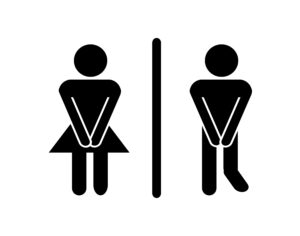Dear Representative Nancy Mace,

Room H-211 in the House of Representatives when it belonged to the speaker of the house. Later it became the parliamentarian’s office, and then the women’s restroom in 2011.*
Since you presumably wouldn’t set up an entire bill to hurt people just out of malice, I gather you must genuinely fear for your safety.
So what are you afraid will happen to you if Representative McBride uses the same bathroom? That she will assault or harass you in some way? Why? Has she been accused of any sort of inappropriate behavior, that you know of? I can’t imagine her district would have elected her if she had had accusations of sexual assault hanging over her head. If she’d been a Republican, sure, but she ran as a Democrat. An openly transgender Democratic state senator, at that. She’d need to be squeaky clean to get elected to this position.
And why would you expect someone in her precarious position to harm one of her new colleagues, anyway? Surely that would lead directly to her ouster. And unless you think she campaigned for her position expressly to gain access to a bathroom of female Congresspeople to harass or assault exactly once, she has far too much at stake for that.
Okay, so maybe you’re not afraid of her saying or doing something to you. Are you afraid instead of her looking at you, or … thinking about you?
So, first, most people in bathrooms are thinking about going to the bathroom. If they think about other people, in my experience, it’s pretty much to worry about what others are thinking of them. In the case of trans people, it’s actually most likely to be whether they can pee in safety, not because of fear-mongering lies but because of actual statistics and actual experiences of being bullied and harassed.
Next, are you concerned that she’d be thinking about you in a sexual way, because she’s in a bathroom? That’s…very self-centered, really. I mean, anyone could be attracted to someone they encounter in a public space, but we don’t try to keep everyone out of public space because of that. Do you also want lesbians out of your bathroom? And bi women? What about straight women who happen to have the odd attraction they were supposed to repress? How are you to know what they’re thinking?
If you’re thinking about other people’s sexual thoughts about you while peeing, without any evidence, that sounds like a “you” problem. Maybe you should be removing yourself from the situation and not bothering them.
Or do you just find it annoying and inconvenient to think worrisome thoughts about her while you pee, and you would rather she go away and not get to pee just so you don’t have to have some uncomfortable thoughts for a few minutes occasionally?
Perhaps, along the lines of Rosanne’s immortal TV response to her sister Jackie on going to a gay bar (“What if they think I’m gay?” “Well, then you could just think they’re gay right back at them!”), you could choose to think mean things about her while you’re both in there, and maybe that would help you feel better.
Or you could choose to think generous things, like maybe how hard it must be to be challenged all the time just for wanting to pee! (Because don’t think she wouldn’t be challenged or harassed if she went to the men’s room.) And how you’ve never experienced this kind of challenge in all the years you’ve used public bathrooms.
If you think that you personally would be safer if Sarah McBride used the men’s room, you presumably also think Sarah McBride would be safer if she used the men’s room? Right? Because you wouldn’t want to put a colleague in danger, right? Honestly, if you think the men’s room is safer for female-presenting people than the women’s room, then perhaps you’re the one who should be using it?
Statistically, trans people are vastly more likely to be the recipients of assault or harassment than to be perpetrators. Whereas 92% of sexual assault perpetrators are men. Why would you ask someone who is most likely to be victimized to go to the place where people are most likely to be perpetrators?
Oh, wait! You’re in Congress. Maybe Congress could pass a law saying that harassing or assaulting people is illegal! Or … maybe it already is.
(Or maybe not, since Marjorie Taylor-Greene has already threatened Sarah McBride with violence…)
One more thing: just to be absolutely clear, are you saying you’re okay with trans men using the women’s bathroom? Even if you can’t tell they’re trans? Just male-presenting people using the women’s room because they’re legally obligated to after all these bathroom bills? Will you commit to making sure not to challenge them on their right to be in your bathroom? Because if you won’t, then you’re not being honest, possibly with yourself, about your plans for trans people or about your own discomfort.
Finally, and I realise this is not really relevant, but it just seems so striking … I was looking up Rep. McBride’s background, and…are you really going after someone who ten years ago was widowed just four days after getting married, because you don’t want her to go to the bathroom? It seems somehow extra petty.
Thank you for your time. Some resources below.
Jennifer Sheffield
– https://juliaserano.medium.com/transgender-people-bathrooms-and-sexual-predators-what-the-data-say-2f31ae2a7c06 (includes specific studies and sources, including the following one)
– https://thinkprogress.org/study-debunks-bathroom-safety-concerns-over-transgender-equality-af932113a4fa/
– https://www.pbs.org/newshour/politics/a-look-at-womens-advances-over-the-years-in-congress
– https://www.washingtonpost.com/lifestyle/style/women-in-the-house-get-a-restroom/2011/07/28/gIQAFgdwfI_story.html
*Note: The photo comes from this document, but since I found it on a search, and it’s a single chapter from a book, I’m not sure what the source actually is.

